Sadeem: Flood mitigation around the world
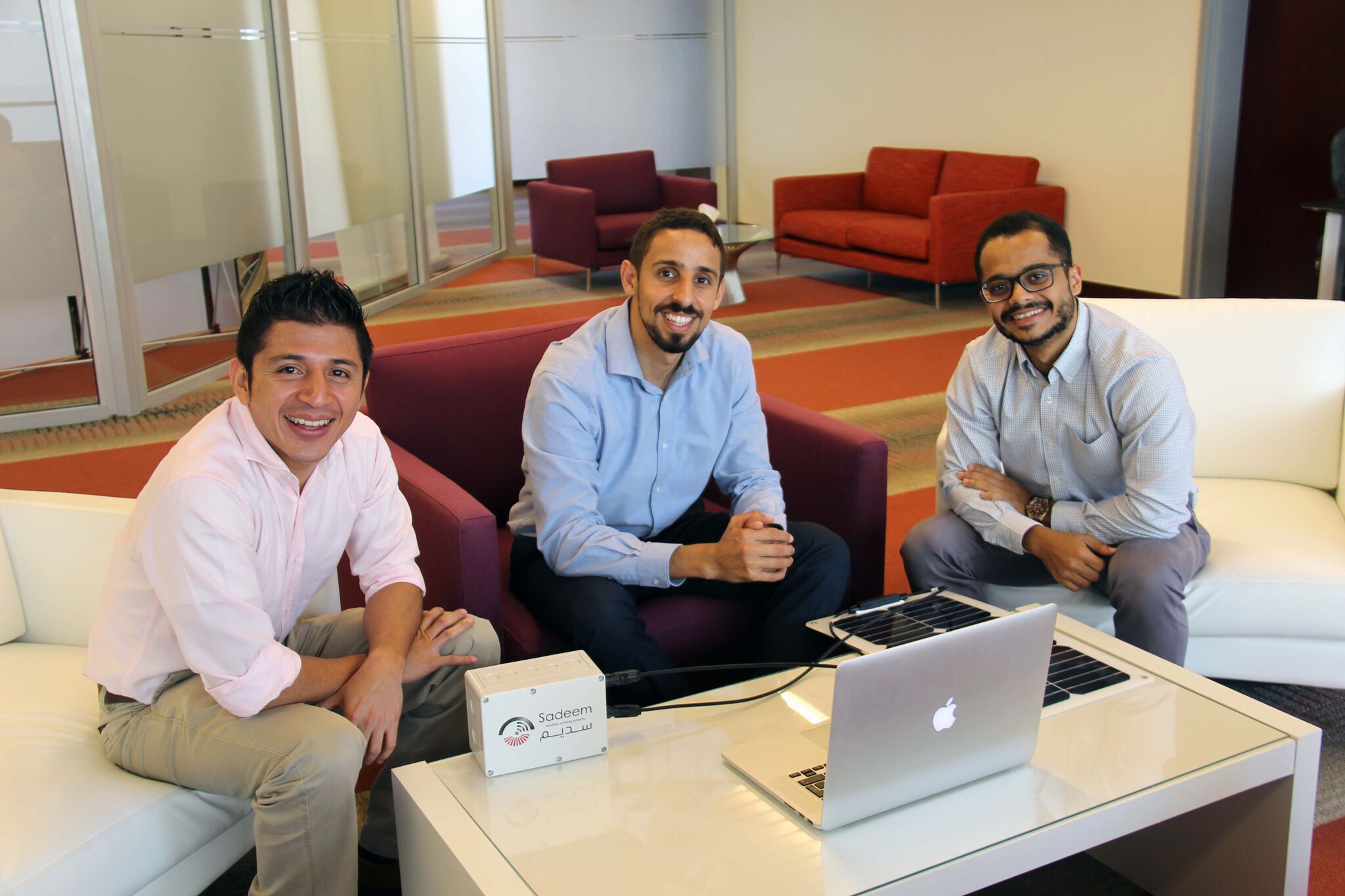
(From left to right): Sadeem co-founders Esteban Canepa, Ahmad Dehwah and Mustafa Mousa began their startup during their Ph.D. studies at KAUST, with a goal to mitigate damage and save lives from floods. Photo by Caitlin Clark.
A damaging natural disaster
Floods are one of the world’s most damaging natural disasters, with few places on Earth immune to their risks. Most commonly occurring from heavy rains, they can also take place due to storm surge from hurricanes, tropical cyclones or tsunamis in coastal areas, high tides, dam failures or rapid ice melting.
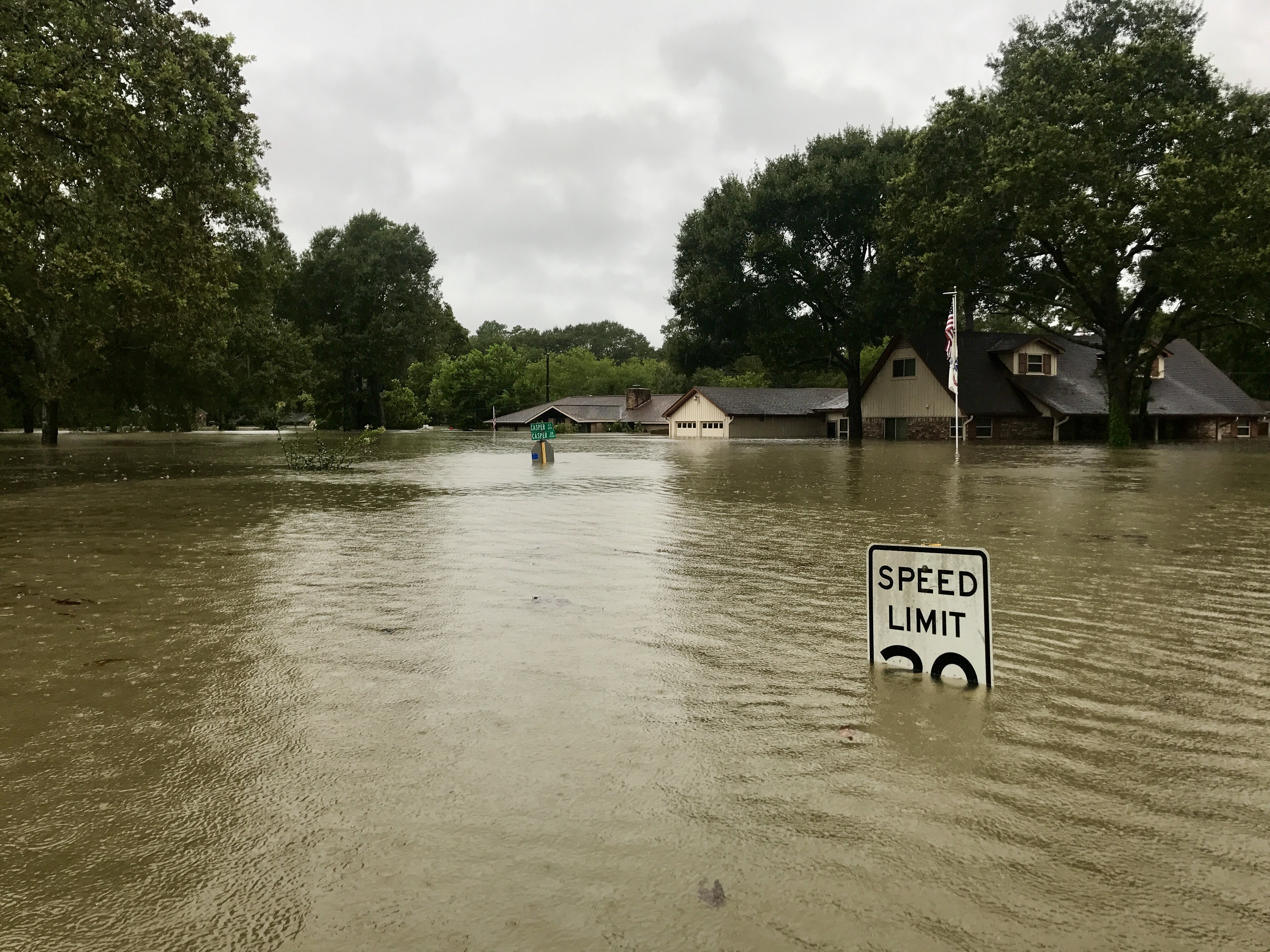
This year, major Hurricane Harvey produced catastrophic, historic and life-threatening flooding when it hit south and southeast Texas, U.S., from August 25 to 30. In this image, a Houston, Texas, street floods from the storm. Photo courtesy of Shutterstock.
Flood damage is extremely costly and extends far beyond the originally inundated areas, affecting human lives, health and property, public infrastructure, industry, the economy, ecological systems, the environment and cultural heritage. In the U.S., where flood prediction and mitigation are advanced, yearly damage from floods is estimated at over $6 billion. Mitigation focuses on structural and non-structural methods, including building levees and dams, flood-proofing homes and the installation of early warning systems.
Flood information
Mousa, Canepa and Dehwah have all been personally affected by floods. Flooding hit the Western Province of Saudi Arabia, including the cities of Jeddah and Makkah, in 2009, 2010, 2011 and 2014, while the three were living there. In 2007, before Canepa came to KAUST from his native Mexico, his home state of Tabasco suffered from a major flood.
“I saw what the flood did in Tabasco to urban areas,” Canepa said. “When I came to Saudi Arabia in 2009 and there was a serious flood in Jeddah, I thought to myself, ‘The floods are following me and I have to do something about this.’”
“The problem with flooding lies in the lack of information—information about the flood, the severity, the magnitude, the propagation—of the flood in the streets in real-time,” noted Mousa. “We started as a research group to address all of these issues, knowing that, until Sadeem, there was not a sensor out there that could be deployed in the streets and get information about floods.”
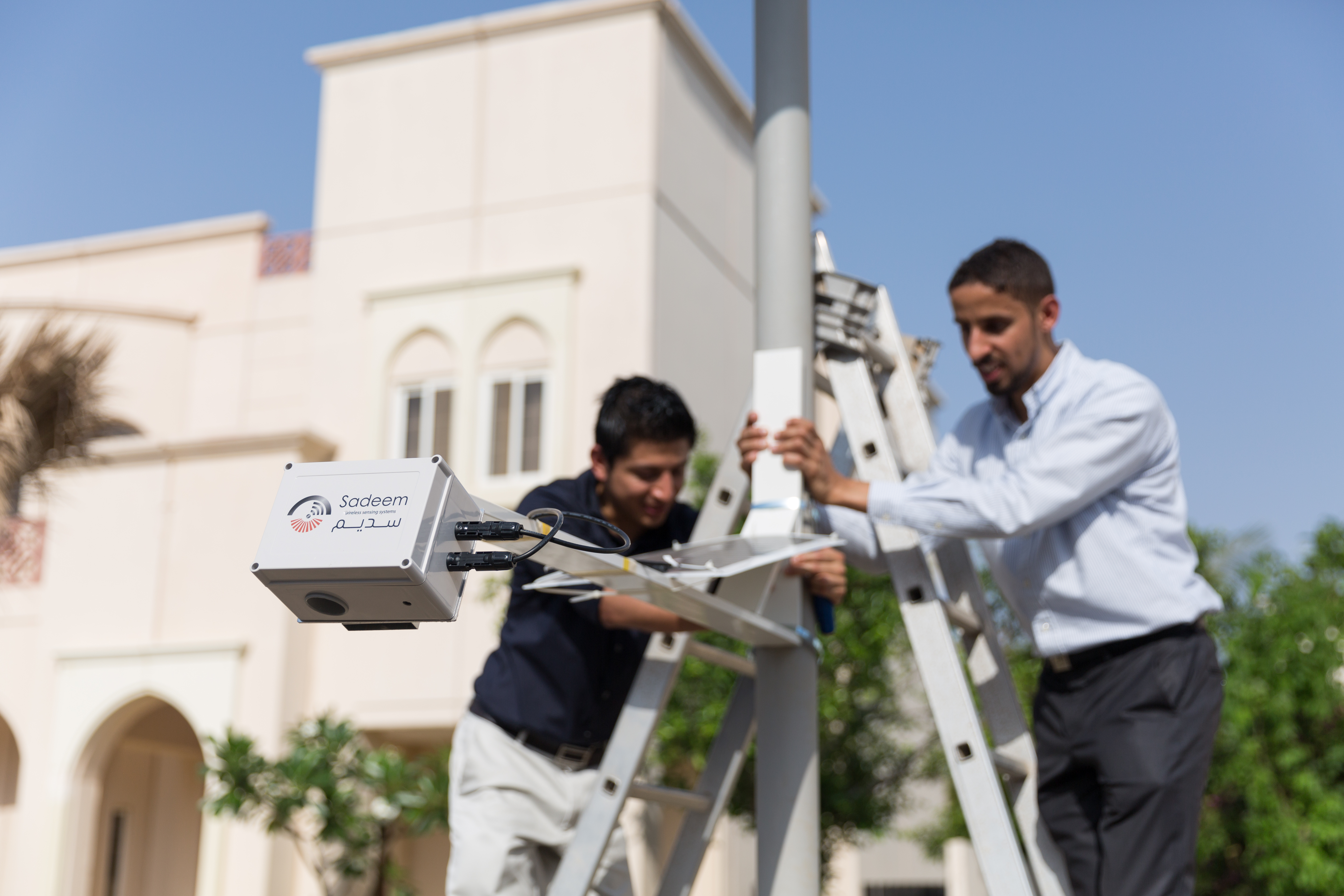
Sadeem co-founders Esteban Canepa (left) and Ahmad Dehwah (right) work on installing one of their company's flood and traffic sensors on the KAUST campus. Photo by Lilit Hovhannisyan.
Sadeem’s technology functions as a wireless sensing device that can be installed in urban areas and in drainage systems in a plug-and-play manner. It is powered by its own solar panel and does not interfere with the power grid or the cellular network, which are usually down during flood events.
“Sadeem is the world’s first multi-patented flood and traffic information system,” Dehwah said. “It offers a novel early detection and monitoring flood system that includes a sensor network, mobile applications and visualization tools to face floods in better ways and mitigate their effects.
“The network communicates with the internet, where data is visualized in a suite of apps for flood management, flood forecasting and safe traffic routing during flood events—and, when floods are not taking place, Sadeem’s system monitors traffic flow and congestion. We aim to avoid casualties during floods and reduce the economic losses of floods by 30 percent.”
(From left to right): Sadeem co-founders Mustafa Mousa, Ahmad Dehwah and Esteban Canepa work in the KAUST lab on modifying their technology for their traffic and flood sensor system. Photo by Nicholas Demille.
‘An ambitious project’
Sadeem’s path to inception was not a clear one. Both Canepa and Dehwah joined KAUST in 2009 as founding class master’s degree students, with Mousa starting his master’s degree at KAUST in 2010. By 2011, Claudel had joined the University’s Computer, Electrical and Mathematical Science and Engineering Division as an assistant professor, that year becoming the Ph.D. advisor of all three.
“Everything started as a Ph.D. project in electrical engineering,” Canepa explained. “We needed smart cities technologies to do our research and write our papers for our Ph.D.s, but it was difficult to find this technology, so we developed our own, and as we did, we began realizing that this was something we could actually commercialize—it was bigger than just a research project.”
The technology for Sadeem began as the three co-founders' Ph.D. project at KAUST. Photo by Nicholas Demille.
“Our advisor talked to us about a wireless sensing networks project, and I knew it was an ambitious project—a huge project. I told him that I would be excited to join such a project, but that it was definitely a three- to five-year project for our Ph.D.s, which was what we jumped into,” Dehwah said.
“Originally we didn’t have a special target,” noted Mousa, “but we knew that wireless sensor networks were becoming a trend and that they can solve complex problems, enhancing the quality of life in cities. We shaped these ideas into specific projects we led independently in our research, and found soon afterwards that we shared a common goal, which by 2014 became Sadeem.”
Becoming entrepreneurs
The Sadeem team (from left to right: Esteban Canepa, Mustafa Mousa and Ahmad Dehwah) worked with former KAUST Assistant Professor Christian Claudel on specific independent projects during their Ph.D.s that, by 2014, became Sadeem. Photo by Nicholas Demille.
On March 10, 2016, the team won the award for best IP-based technology startup at KAUST from the University’s Entrepreneurship Center, part of Innovation & Economic Development. Dehwah, Canepa and Mousa all agreed that this was the “life-changing moment,” as Dehwah said, when they began prioritizing their new startup over all else and embraced the roles of full-time entrepreneurs.
“I will never forget that moment. Beyond the economic prize we received, it was also the recognition of something we worked on for such a long time,” Canepa said. “That year was the tipping point in terms of us all saying, ‘This is what I am going to be doing for the years to come.’ The timing was perfect for us, because we also received our Ph.D.s together in December of 2016, and we were already a fully committed team. When everything aligns, things start happening, and you really see this.”
Sadeem won the award for best IP-based technology startup at KAUST from the University’s Entrepreneurship Center on March 10, 2016. Photo courtesy of Sadeem.
In 2016, Sadeem ranked 13th in the top 50 most promising Saudi startups by Forbes magazine, indicating how far the team had come from the start of their journey.
Although Claudel left KAUST in 2015 to move to The University of Texas at Austin, he still remains an important part of the Sadeem team and is the fourth co-founder of the company. He and Dehwah, Mousa and Canepa continue their work together on a daily basis.
The Sadeem co-founders (from left to right: Mustafa Mousa, Ahmad Dehwah and Esteban Canepa) note that team spirit is an important part of their success. Photo by Nicholas Demille.
“What matters the most is the team spirit,” Dehwah said. “Entrepreneurial work is never relegated to one person—it involves our whole team working together to comprehensively take the next steps, even if one person works remotely. We know our individual weaknesses and strengths and how to work together from any location.”
First on the market
Sadeem’s technology has been granted two patents, with Canepa noting, “Except for Sadeem, the dual solution of monitoring floods and traffic is currently nonexistent in the market.”
“The sensor locations, their shape, the technology we use, and then the decentralized networking scheme that gathers the information in a database—all these are part of the patents,” Mousa said.
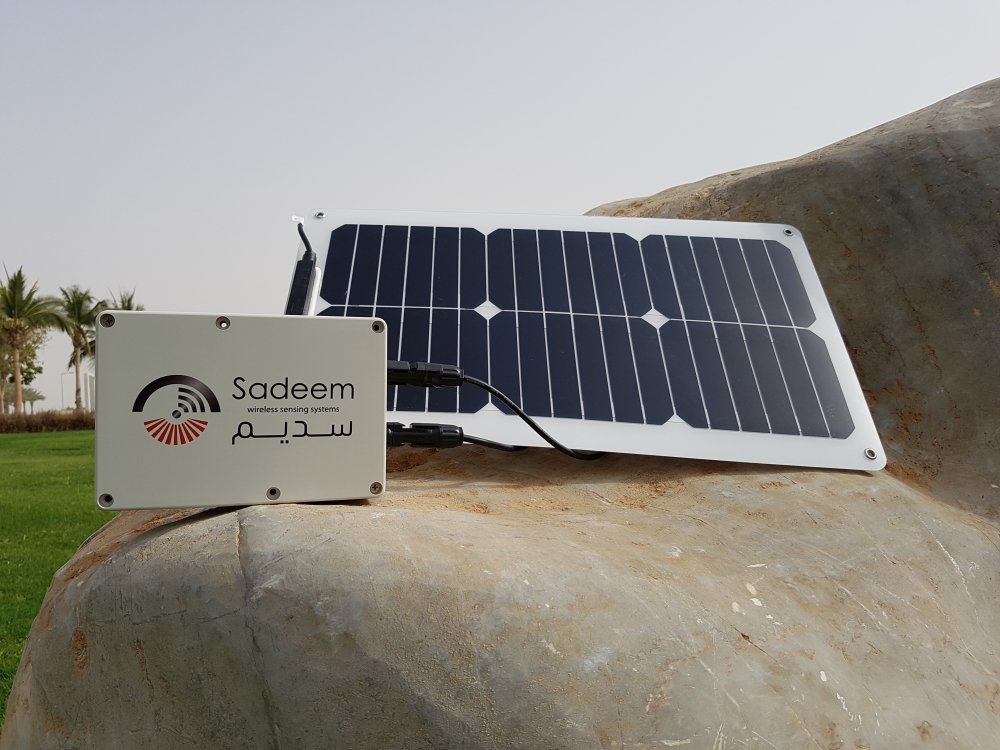
Sadeem's sensors can be installed anywhere, as they feature solar-powered batteries and their own transceivers. Photo courtesy of Sadeem.
“From day one, we put in all the basic essentials that we needed for flood monitoring and for surviving extreme environmental conditions. You can install the devices anywhere—in cities, in valleys, in remote areas—because they have their own transceivers and solar-powered batteries. We have produced something that is flexible and can be installed in a city in a matter of days,” said Dehwah.
“One of the main advantages of this system is that it is non-invasive, which cities value,” Canepa added. “There is no hassle of drilling or construction—the devices are easy to install.”
Capturing in-Kingdom floods
The team began testing their sensor devices in deployments around the KAUST campus from 2012 to 2015, conducting three major tests and a 2014 test in Makkah headed by Mousa with assistance from Saudi Arabia’s Umm Al-Qura University. Throughout this time, the device continued to evolve, transforming from, as Dehwah noted, “the size of 4 meters to a size that a baby can carry, weighing less than 1 kilogram.”
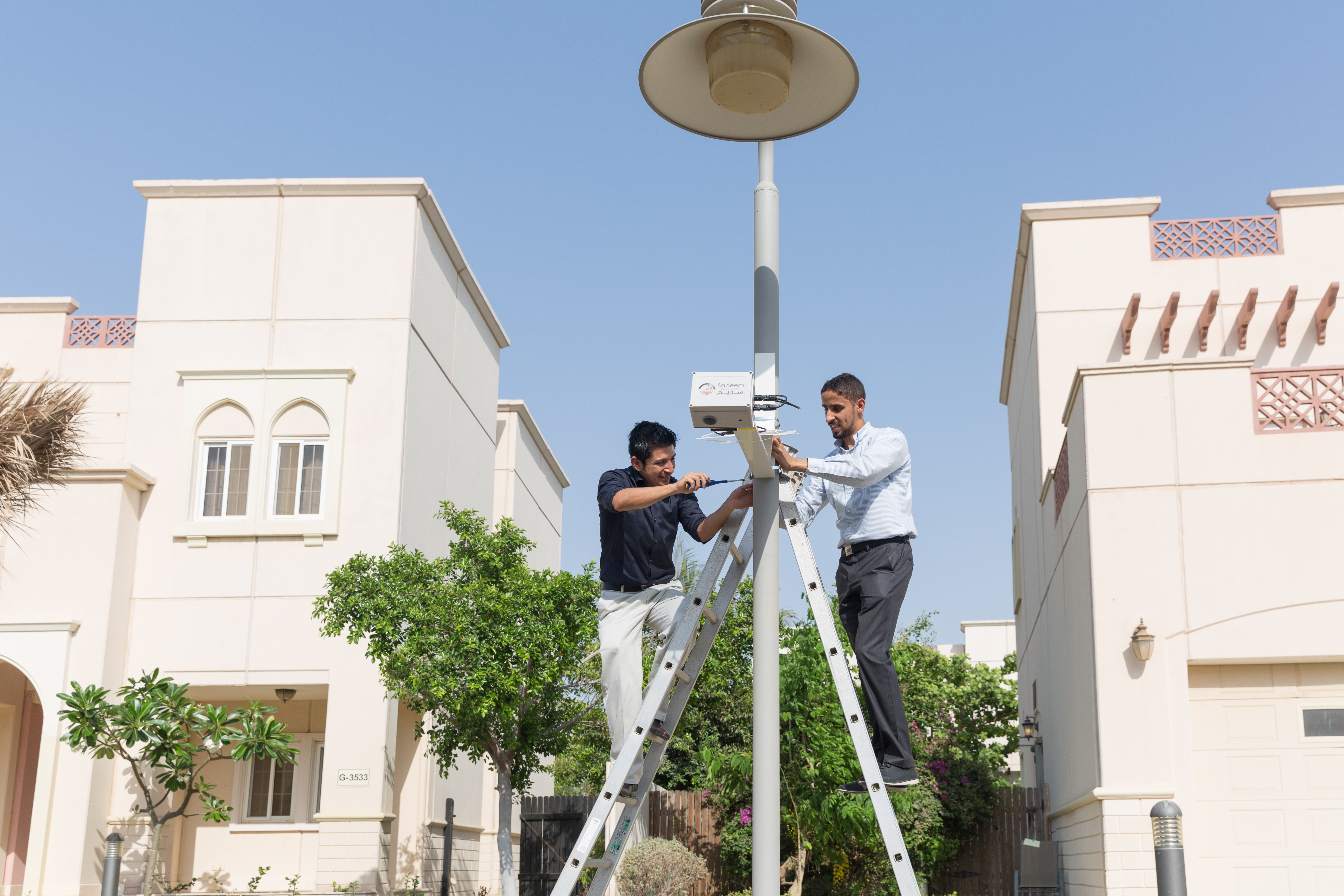
Sadeem co-founders Esteban Canepa (left) and Ahmad Dehwah (right) work on installing one of their sensors on the KAUST campus. Ten nodes currently operate on-campus. Photo by Lilit Hovhannisyan.
“Our deployments were originally a research approach for us to validate the hardware outside in the harsh temperatures, sun and environmental conditions of Saudi Arabia,” Canepa said. “After many years of research, we know that it works, but we’re now conducting deployments to polish the technology itself and optimize and fine-tune it for the cities.”
With a current network of 10 nodes operating across the KAUST campus, the team has a real-time, working example of their product on-site for demonstrations.
“We can show anyone with interest what to expect in terms of parameters to help manage city resources and operations when flood disasters happen,” Mousa said. “If someone wants our devices today, we can deliver them. We are also proud of the fact that over the last six months, we’ve arrived at the industrial standard of resiliency we wanted to achieve for our nodes.”
The Sadeem team displays their KAUST-developed sensor on the University's campus. Photo by Nicholas Demille.
During the Makkah test, the team’s sensors captured a flash flood event in real-time that caused $135 million in losses.
“Had our sensor system been in use in the city at that time, we could have reduced the losses dramatically,” Mousa added. “We aim for a reliable system that can work for years and reaches the standards customers have been waiting for—since yesterday.”
The KAUST Entrepreneurship Center: a key to success
The KAUST Entrepreneurship Center has been a crucial component of the four co-founders’ Sadeem journey. The three Ph.D. graduates received mentorship from the Entrepreneurship Center team and were also part of the KAUST Hikma IP-based Startup Accelerator program, a precursor to the new, expanded all-Kingdom TAQADAM startup accelerator program.
“As scientists, converting our engineering research and technology into a company is challenging, requiring us to learn the basics of business,” Dehwah said. “Without the help we’ve received from the Entrepreneurship Center, this would have been a much harder path to take. Having a novel technology is great, but this will not succeed alone. You need a well-established team behind your technology with an understanding of how to bring it to the market. Support from the Entrepreneurship Center has been priceless.”(From left to right): Sadeem co-founders Esteban Canepa, Ahmad Dehwah and Mustafa Mousa note that support for their startup from the KAUST Entrepreneurship Center has been 'priceless.' Photo by Caitlin Clark.
“The Entrepreneurship Center team is always tweaking the action plan inside of our heads to get us to use the right language and understand business. They helped us as we pivoted from an Internet of Things or IoT platform for smart cities to a flood early warning system, identifying the actual strength and edge of our technology,” Mousa said.
“Bringing together the right people with the right mindset and experience is so important,” Canepa noted. “The Entrepreneurship Center team identified the combination of factors creating a successful story, and their passion for the entrepreneurial world has been contagious. In addition, the University provides us with a lab and office space at the KAUST Research & Technology Park and pre-seed funding, which helps us to feel like a real company with the opportunities and support to get ready to start doing business. With their support, we’re continuing to learn the marketing, public relations, accounting, finance and legal aspects of business together.”
Taking Sadeem to the world
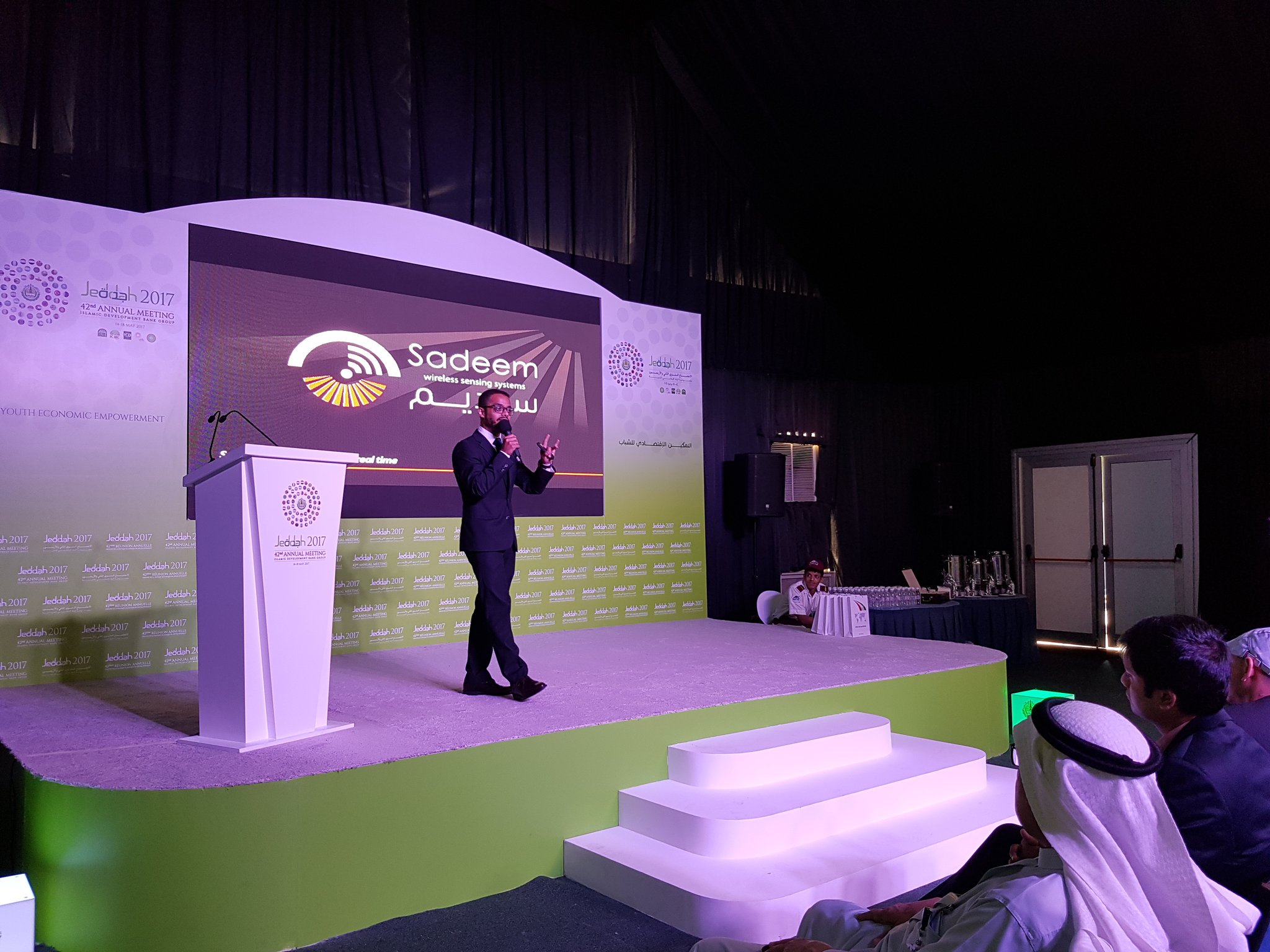
Sadeem co-founder Mustafa Mousa pitches for the startup at the 42nd Annual Meeting of the Board of Governors of the Islamic Development Bank Group in Jeddah, Saudi Arabia, in May. Photo courtesy of Sadeem.
Canepa, Dehwah and Mousa have been busy traveling the Middle East and the world, attending different events to promote their technology and pique the interest of governments, city planners and municipalities. They also bring language skills in French, Arabic and Spanish to their travels, enabling them to communicate with a wide variety of audiences.
“We’re developing an understanding of different zones’ and cities’ markets, each of which has its own needs,” Mousa explained. “We carry out a market fit analysis where we look at the existing cases of floods and the current solutions used to mitigate the flood problem, and then we examine how the features and benefits of our system can fit in these market segments.”
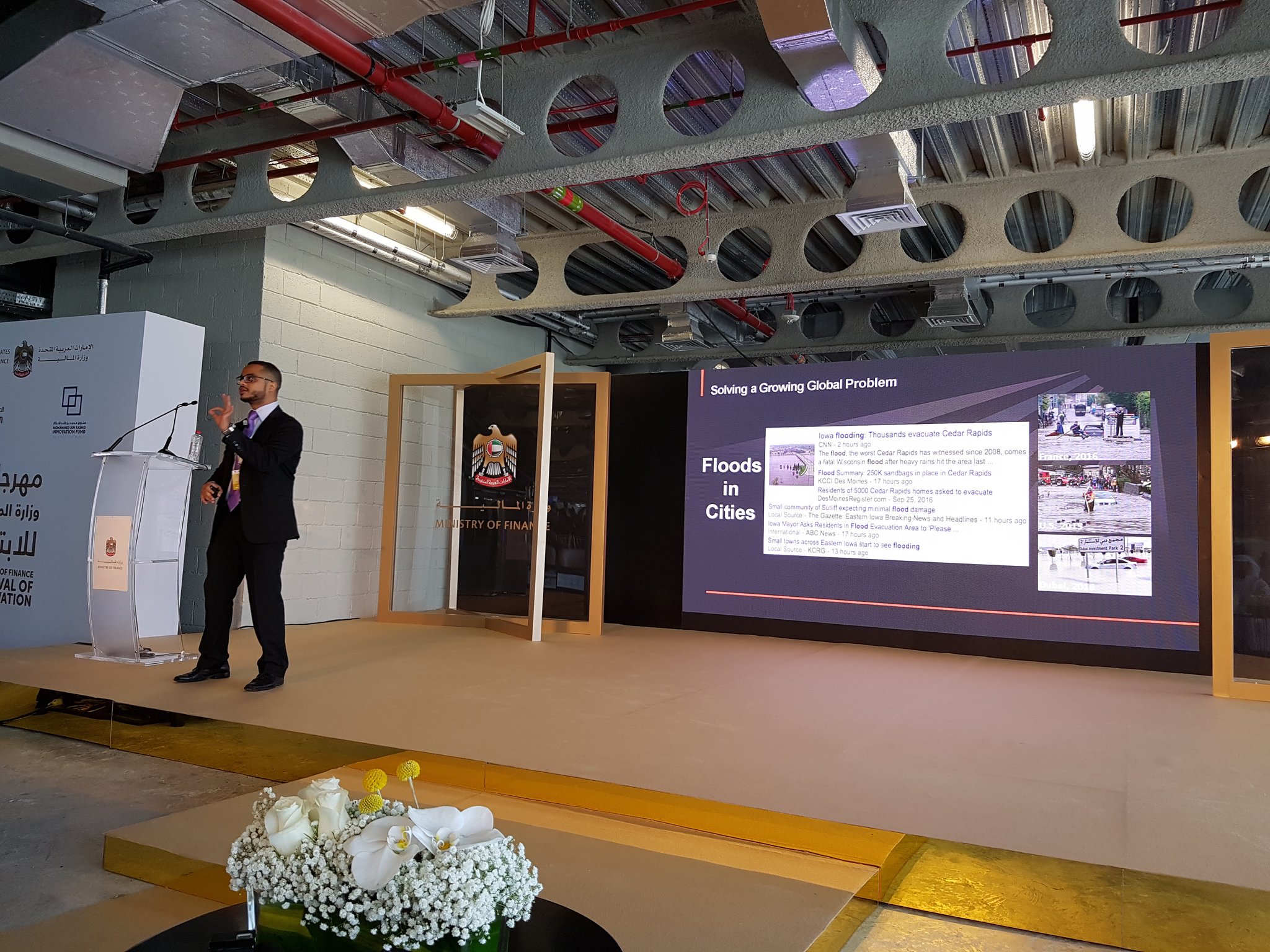
Sadeem co-founder Mustafa Mousa traveled to the United Arab Emirates in November of 2016 to pitch for the startup at the UAE's Ministry of Finance. Photo courtesy of Sadeem.
“Outside of Saudi Arabia, we’ve had interest shown in the rest of the Middle East and in Southeast Asia, North America and Latin America,” Canepa said. “Latin America suffers greatly from floods due to climate change, lack of infrastructure and urbanization. We’ve seen high interest there from cities in applying our technology to optimize the resources already available.”
On October 10, Sadeem won the Best Global Startup award at the 37th GITEX Technology Week in Dubai, UAE, taking home a prize of $100,000.
"This means that our team's hard work is really paying off, and it also puts a lot of commitment on our shoulders to deliver the projects we have and bring more cities to a safe scenario for floods," Mousa noted.
Sadeem at the UN
Canepa recently traveled to Mexico to represent Sadeem at the UNISDR 2017 Global Platform for Disaster Risk Reduction, held in Cancun from May 22 to 26. Recognized by the UN General Assembly and established in 2006, the event is the world’s “foremost gathering of stakeholders committed to reducing disaster risk and building the resilience of communities and nations,” according to the UN.
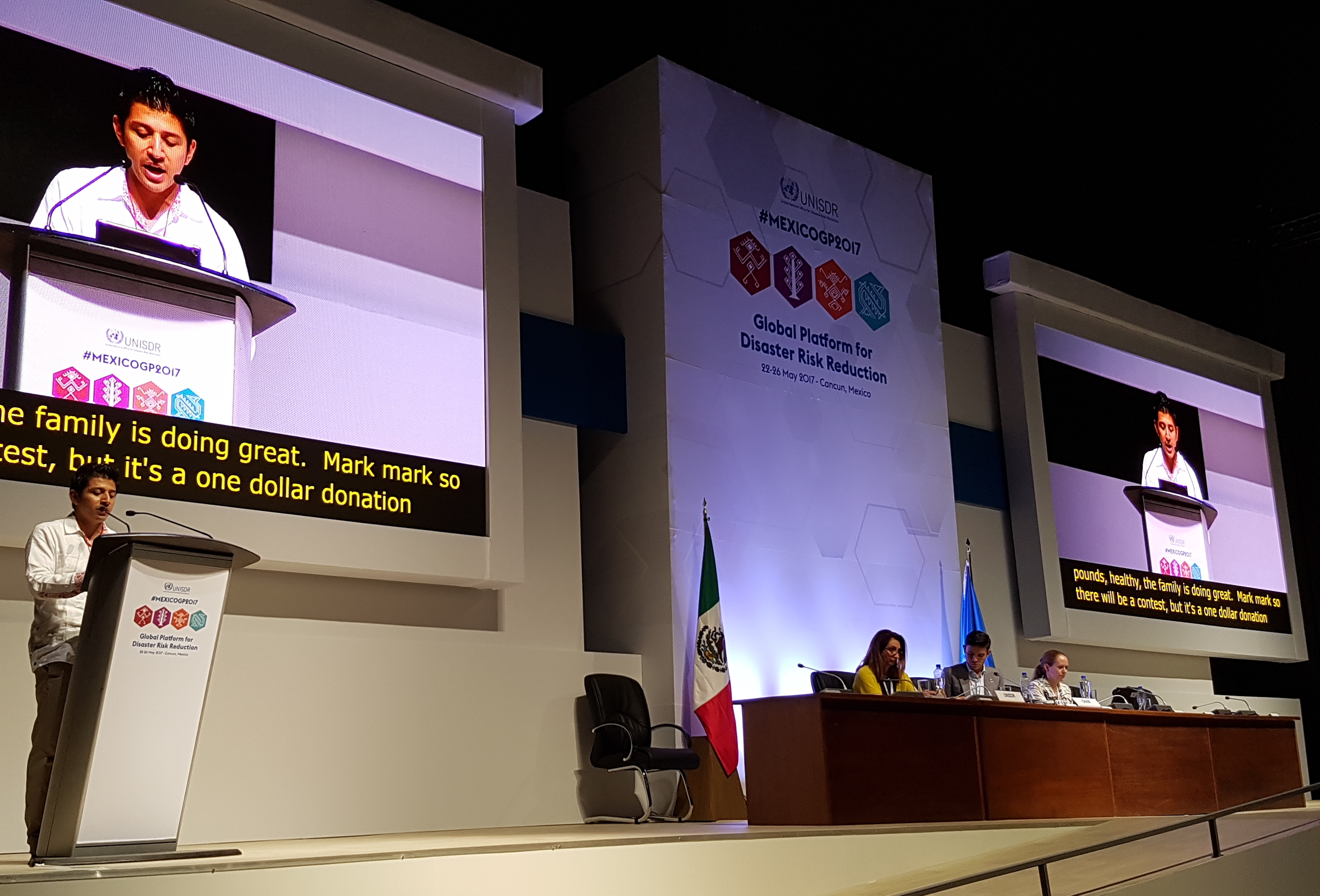
Co-founder Esteban Canepa presents Sadeem to the UN at the UNISDR 2017 Global Platform for Disaster Risk Reduction in Cancun, Mexico, in May. Photo courtesy of Sadeem.
“We applied to give a statement at the Global Platform from the private sector, but few from the private sector were chosen,” he explained. “Speaking for Sadeem and explaining our vision to governments, heads of state and UN representatives was really a standout moment for me. Learning how to interact with and listen to governments and politicians is completely outside of my comfort zone, but it’s a good challenge because you discover how to represent technological solutions at a scalable point of view.”
“No matter how amazing a technology is, if you don’t know how to present it to the society you are going to be benefitting in the right way, it might fail,” Canepa said. “This isn’t because of the technology—it’s because of the logistics and the presentation approach. We know now that we need to rely on local knowledge to bring a global project to cities.”
Benefiting the Kingdom—and beyond
Although the co-founders are looking outwards for the future, they are also cognizant of the role KAUST—and Saudi Arabia—played in their journey so far. Both Dehwah and Mousa lived in Saudi Arabia their whole lives, and all three received their master’s and Ph.D. degrees from the University.
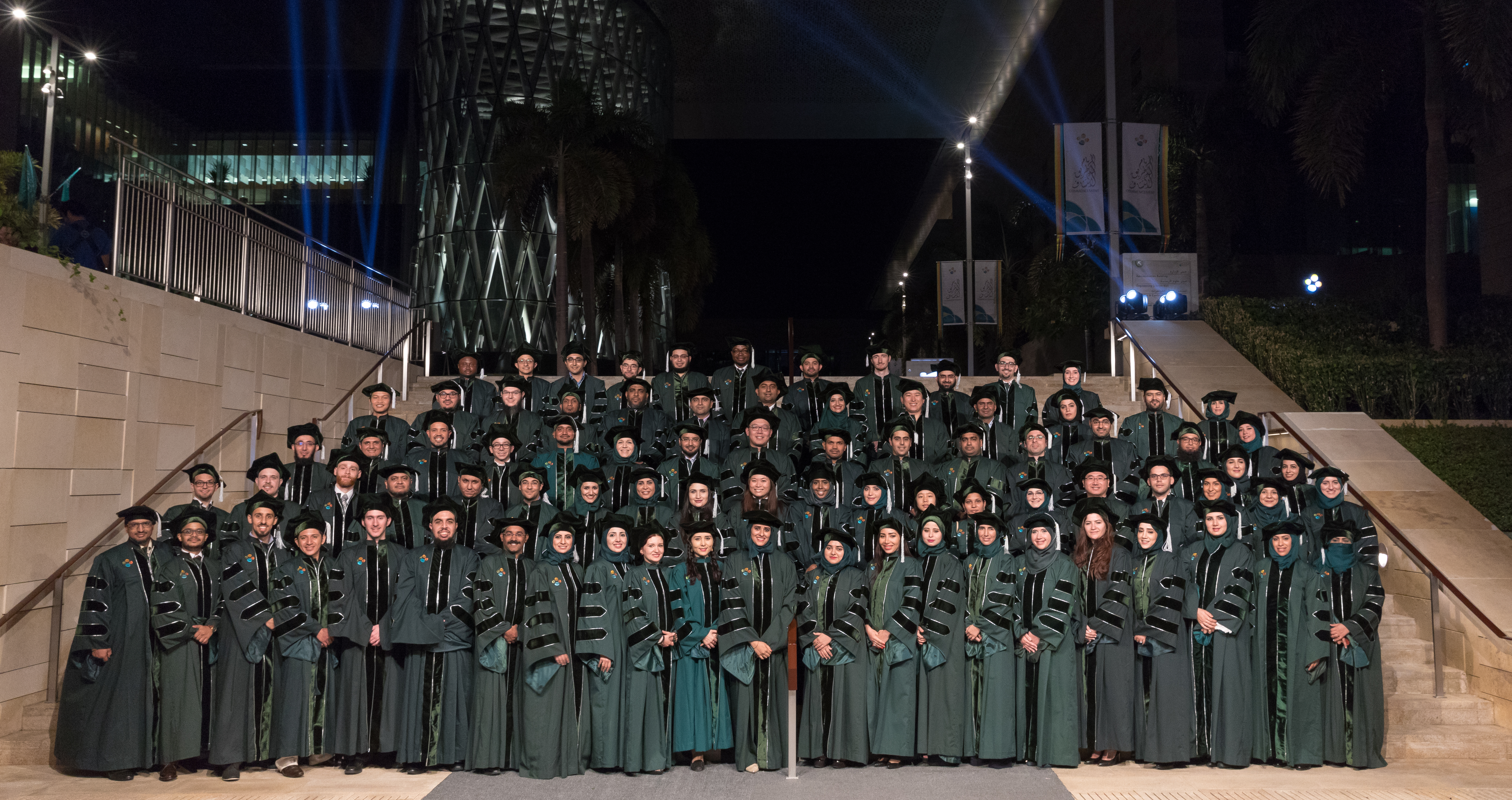
The three Sadeem co-founders Mustafa Mousa, Ahmad Dehwah and Esteban Canepa (pictured, front row, second, third and fourth from left) received their Ph.D.s from KAUST together at the University's seventh Commencement ceremony in 2016. Photo by Helmy Al Sagaff.
“We want to provide our technology to the Kingdom as payback to the places we came from and the people and institutions that enabled us to reach this level,” Mousa said. “Sadeem was developed here in the Kingdom for the benefit of Saudi Arabia and the world, and KAUST supported us through the journey. It only makes sense to give back in this way.”
“We aim to prepare the Kingdom for the weather challenges of the coming years,” Canepa continued. “We’re really proud of developing our technology in Saudi Arabia—although it’s not the complete solution for floods, it’s a piece of the complete solution that can complement other aspects of flood management.”
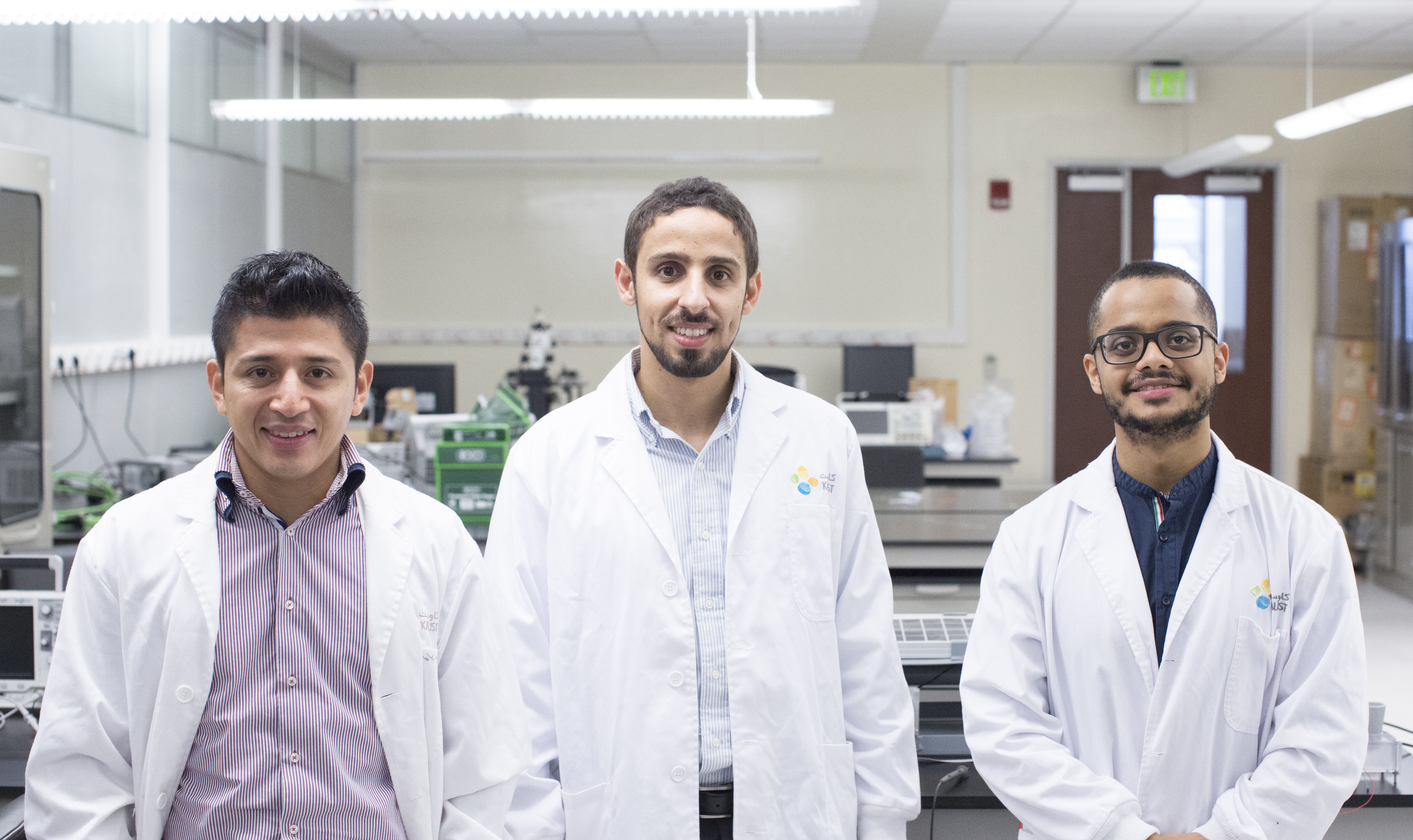
The Sadeem team aims to give back to and benefit Saudi Arabia—and the world—through their lifesaving flood mitigation technology. Photo by Nicholas Demille.
“Each one of us comprehensively completes Sadeem, but in the future we will need manpower with the right skills and resources to take us further," Mousa added. "People are by far the most valuable asset in any system, and transferring our vision to the people we bring to the company is highly important. Talented and committed people make the difference in a team—and Sadeem is a multicultural team from a unique background.”
“For me, the highlight has been all of us jumping into this and committing to taking the risk of going forward with Sadeem after finishing our Ph.D.s,” Dehwah said. “This was the moment we all had to make a decision, and I’m so glad we jumped into it. Along the way, the most important thing you learn is that nothing is impossible. You work hard and you find a way to make it happen.”
- By Caitlin Clark, KAUST News

